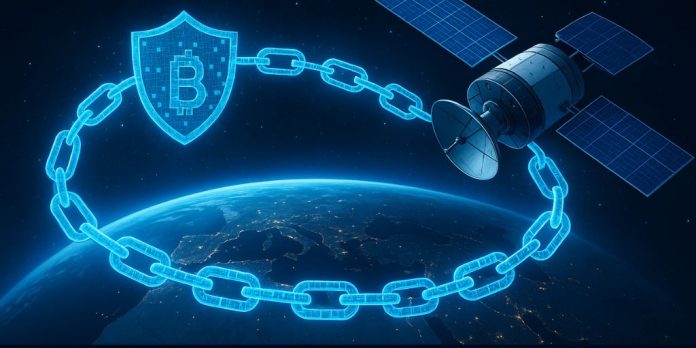In today’s hyper-connected world, satellite systems play an essential role in communication, defense, navigation, and global infrastructure. However, with increasing reliance comes a rising threat: cyberattacks on satellite networks. Traditional security methods are struggling to keep up with the evolving complexity of these threats.
Enter blockchain technology, the decentralized, tamper-proof solution that’s reshaping the future of satellite security.
In this article, we’ll explore how blockchain enhances satellite security, the challenges it addresses, real-world applications, and what the future holds.
Why Satellite Security is Under Threat
Satellites are no longer isolated marvels orbiting Earth, they are critical nodes in a vast digital ecosystem. Their vulnerabilities expose:
- Military operations
- Global financial systems
- Emergency communication
- Transportation logistics (like GPS navigation)
Cyberattacks like signal jamming, spoofing, and unauthorized access can cripple satellite operations.
The consequences? Potential billions in losses, national security risks, and life-threatening emergencies.
What is Blockchain all About?
Blockchain is a decentralized ledger technology where data is recorded across multiple nodes.
Key characteristics include:
- Decentralization: No single point of failure
- Immutability: Once data is recorded, it cannot be altered
- Transparency: Every transaction is verifiable
- Security: Data encryption and consensus mechanisms make hacking extremely difficult
These features make blockchain an ideal candidate for enhancing satellite security.
How Blockchain Secures Satellite Systems
Here’s a deep dive into how blockchain addresses satellite security vulnerabilities:
1. Secure Command and Control
Traditionally, satellite command systems are controlled by centralized ground stations. If a hacker compromises the control station, they can take over a satellite.
With blockchain:
- Commands are verified through a decentralized network.
- Only authenticated and consensus-approved instructions reach the satellite.
- Unauthorized commands are automatically rejected.
Impact: Eliminates single-point vulnerabilities and greatly reduces the risk of hijacking satellites
2. Data Integrity and Tamper-Proof Communications
Satellites constantly send and receive massive amounts of sensitive data.
Blockchain ensures:
- Every piece of data transmitted is hashed and time-stamped.
- Any attempt to alter or fake the data will immediately be detected.
- Communication logs are immutable and auditable.
Impact: Guarantees authenticity, making eavesdropping and data manipulation nearly impossible.
3. Decentralized Satellite Networks (Constellation Coordination)
Satellite constellations (like Starlink) involve hundreds or even thousands of satellites communicating.
Blockchain can manage:
- Autonomous coordination between satellites
- Resource sharing (bandwidth, storage) securely
- Collision avoidance decisions through consensus algorithms
Impact: Reduces latency, increases fault tolerance, and promotes self-healing networks.
4. Smart Contracts for Satellite Services
Imagine leasing satellite bandwidth or storage space on demand automatically, without human intervention.
Smart contracts (self-executing agreements coded on the blockchain) allow:
- Automated service agreements between clients and satellites
- Real-time payments (often using cryptocurrencies)
- Transparent service-level agreements (SLAs)
Impact: Opens up new business models while ensuring trust between providers and users.
5. Resilient Identity Management
Each satellite, ground station, and user device needs a unique and verifiable identity.
Blockchain enables:
- Decentralized Public Key Infrastructure (DPKI)
- Immutable digital identities for all network participants
- Zero Trust Architecture — no one is automatically trusted
Impact: Strengthens authentication and access control across the satellite network.
Real-World Examples and Initiatives
Several pioneering projects and agencies are already experimenting with blockchain for satellite security:
- Lockheed Martin: Integrating blockchain into cybersecurity strategies for satellite control.
- NASA: Researching blockchain-based autonomous spacecraft operations.
- Orbital Blockchain (Concept): Proposals for decentralized space asset management using blockchain nodes in orbit.
Private companies are also exploring blockchain-secured satellite internet services, creating a new era of secure global connectivity.
Challenges and Considerations
While blockchain offers incredible advantages, it’s not a magic bullet.
Here are key challenges:
- Latency: Blockchain consensus mechanisms can introduce slight delays which is critical in real-time satellite operations.
- Scalability: As the number of satellites grows, blockchain networks must scale efficiently.
- Energy Consumption: Traditional blockchains (like Bitcoin) are energy-intensive and are not ideal for satellites with limited power.
- Regulatory Hurdles: Space law is still catching up with decentralized technologies.
Solution? Development of lightweight blockchains (like Proof of Authority or Proof of Stake) and tailored consensus algorithms optimized for space environments.
Blockchain and the New Space Economy
The fusion of blockchain and satellite technology will fuel the rise of the new space economy, where space assets are democratized, autonomous, and secure.
Expect future innovations like:
- Decentralized Space Marketplaces (for satellite data, imagery, bandwidth)
- Crowdsourced Satellite Operations using tokenized incentives
- Autonomous Spacecraft Networks negotiating services without human control
Blockchain could be the backbone of the next-generation space infrastructure, ensuring it remains resilient, secure, and open for all.
Final Thoughts
As satellites become the beating heart of global digital life, securing them is not optional, it’s critical.
Blockchain brings a revolutionary toolkit to the table: decentralization, transparency, and trustless operation.
While challenges remain, the potential to reshape satellite security and unlock a thriving space economy is massive.
Blockchain isn’t just an innovation for satellites, it’s a lifeline for the future of secure space operations.
FAQs
Q1: Can blockchain completely prevent satellite hacking?
Not entirely, but it can make hacking exponentially more difficult by removing single points of failure and ensuring data integrity.
Q2: Are there any satellites already using blockchain?
Research projects and prototypes are underway, but widespread implementation is still developing.
Q3: What blockchain type is best for satellite networks?
Lightweight, energy-efficient blockchains like Proof of Authority (PoA) or delegated Proof of Stake (dPoS) are better suited.

